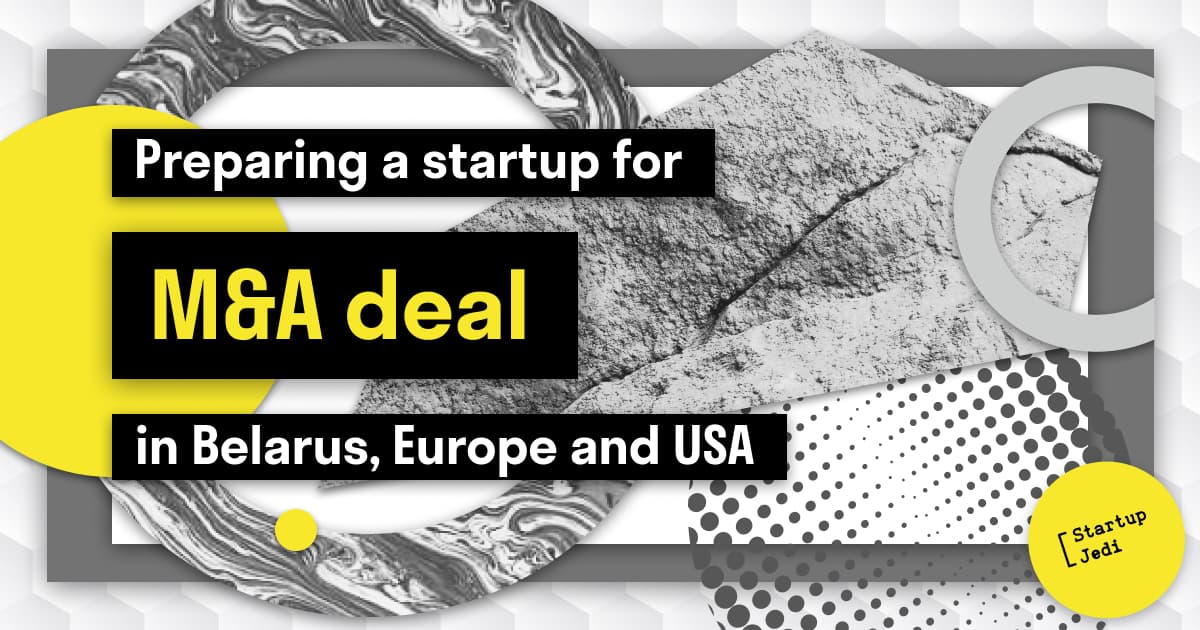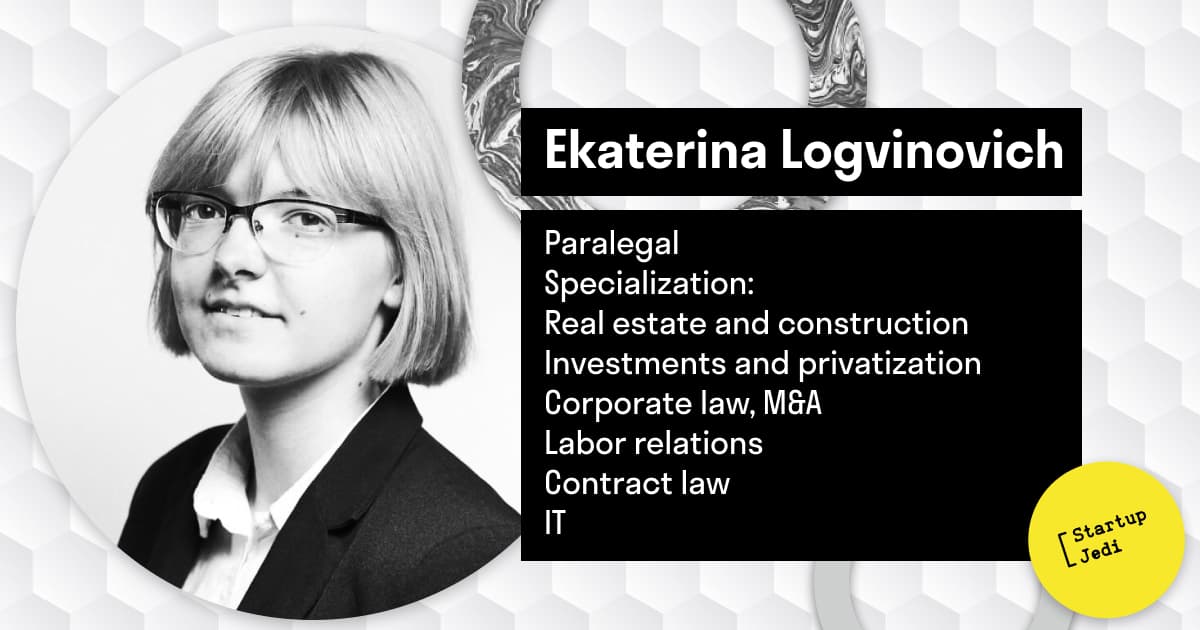
Startup Jedi
We talk to startups and investors, you get the value.
M&A deals, or mergers and acquisitions, are deals to sell a company or merge with another business. For startups, M&A deals usually take place when the founders leave, although they can also be done for other purposes, such as merging with another startup to integrate products. This determines the main difference between venture and M&A deals. If the former are concluded by a startup in the early stages, the latter is relevant when the business is already developed and makes a profit.
Ekaterina Logvinovich, junior lawyer at SBH Law Offices, tells in detail how a startup should prepare for an M&A deal, what its preliminary stages are, how to define goals for an M&A deal, and other aspects in today's article.

Startup Jedi
We talk to startups and investors, you get the value.
The first steps to prepare a company for an M&A deal should be taken as soon as it’s created. Regardless of the objectives of the deal, the buyer will be interested in the company’s history in detail as they will be willing to identify risks, understand the specifics of the business and opportunities for its integration with other companies. Minor flows identified by the buyer before the deal can be quickly eliminated, but systemic problems and violations will serve as an argument for lowering the company’s valuation or canceling the deal.
Choosing the right legal corporate form
In order for a startup to raise investments and enter into M&A deals, it is necessary to register a legal entity in a form that is convenient for potential buyers. The buyer will be ready to purchase a business only if the deal does not entail personal responsibility for them.
For this reason, limited liability companies and joint stock companies are the most suitable forms. Unlike partnerships, they limit the risks of losing investment for all participants (shareholders), without liability for the company’s debts.
Transparent history
The company must have a transparent and understandable corporate history.
In practice, there are situations when a startup operates through several legal entities at once: shares between the founders are distributed in one company, contracts with the client are signed by the second, and the money is transferred to the third. You should always start with one company, to which all intellectual property is transferred, contracts with the team and clients are drawn up, and financial flows are directed.
As the business develops, it may be necessary to create other legal entities, for example, when entering the markets of other countries. In this case, a group of companies is formed in which the holding company owns subsidiaries. At the same time, it is for the holding company that intellectual property is registered, and investments are raised. This structure will allow the buyer to immediately acquire the entire business through the purchase of shares in the holding company, which will significantly reduce the time for an M&A deal.
If there are problems in the structure of a startup, they need to be solved as early as possible, since as the business develops, the client base expands, and the turnover increases, this will be more difficult to do.
Statutory compliance
Other aspects to look out for from the start of a business include:
Compliance with the procedure for making corporate decisions in accordance with applicable law and the charter (compliance with the competence of bodies, quorum, approvals and recommendatory votes, preemptive rights);
Conclusion of agreements with all clients on payment terms and adhering to them as well as making payments in accordance with them;
Formalization of relations between the company and all employees, especially key specialists and officials (inclusion of confidentiality clauses and the transfer of intellectual property, regular payment of salaries);
Transfer of intellectual property rights to the company from its founders;
Timely filing of tax returns and payment of taxes;
Reflecting all completed business deals in the accounting.
Business independence
By the time they start searching for buyers, a startup should be ready for alienation as an independent business, that is, its potential sale should not be accompanied by loss of value, commercial and legal risks.
The assets of the company must be registered in the name of the company, not its founders. Business processes should be established directly with all counterparties (suppliers, payment services, customers), and not through the third parties that are the founders’ companies.
For example, situations arise when the main activity is carried out through one company, and the employees are “registered” to another legal entity of one of the founders. Or the rights to the site are reserved by the founder.
If, as a result of the deal, part of the business “falls out”, the buyer will refuse to complete it.
...

The active phase of preparing a startup for an M&A deal begins several months before you start searching for buyers.
Define goals for the M&A deal and key interests of the founders
A startup’s intention to carry out an M&A deal can arise for various reasons:
Full exit from the business is used when the business has reached the stage where it can be sold, and its founders are ready to transfer it entirely.
Transfer of control. The founders decided to transfer management to the investor, but retain a minority stake in the capital.
Merging with another company is required to develop or expand a business, reduce costs, protect the market.
Accordingly, the type of deal will differ.

Determine the value of the company
Before negotiating, founders need to develop an approach to valuation that can be justified to buyers. There are different ways to evaluate a startup. The choice of one of them depends on the stage of the business, financial and economic indicators, the specifics of the activity and the product.
To determine the value, it may be necessary to evaluate existing assets, analyze financial indicators and the market. If this is not done in advance, negotiations may take longer.
...

When you find the buyer, the active phase of preparation for the deal begins. In addition to agreeing on the terms, there are other important nuances that you need to pay attention to.
Drafting the term sheet
If the parties have reached agreement on basic issues during the negotiations, it makes sense to include them in the Term sheet. It will serve as a guideline in relation to the principal conditions when structuring the deal.
It should be borne in mind that the legislation of the United Kingdom and the United States contains the obligation of the parties to negotiate in good faith. If there is a concluded Term Sheet between the parties, then the parties will be obliged to adhere to its provisions. Therefore, in order to prevent litigation, the parties directly prescribe which provisions are legally binding and which are not.
As a rule, the following provisions are established as mandatory:
Confidentiality of negotiations, deals, commercial secrets of the parties;
The obligation not to compete (not to hire away employees, not to acquire stakes in competing companies, etc.);
Exclusivity — an obligation not to look for other buyers / sellers and not to negotiate similar deals.
Whether such provisions are binding depends on the jurisdiction. For example, in Belarus, the obligations of non-competition and exclusivity are impracticable if the Term Sheet is not subject to English law. In the United States and most European jurisdictions, the provisions are valid and enforceable in practice, but the duration may vary. For example, non-competition obligations in Europe are usually limited to 3 years, and 3–5 years in the USA.
Due diligence
One condition for concluding a deal is always checking the company’s activities to identify risks. Typically, the buyer requests a legal (LDD) and financial audit (FDD). A startup can also conduct an internal audit on its own initiative (vendor due diligence, VDD) before the conclusion of the deal in order to eliminate and minimize risks in advance.
Due diligence results directly affect the completion of the deal:
Critical risks can be the reason for the refusal of the deal or the buyer’s price reduction;
Measures to eliminate risks are indicated in the preliminary conditions for closing the deal and affect its timing;
The list of assurances and guarantees of the parties is formed taking into account the audit, which means that the identification of violations or inaccurate information about the company after the deal may entail the responsibility of the founders.
Restrictions on securities
If the startup is registered as a joint stock company, when selling shares, it may be required to obtain permission to deal with securities. Such requirements are established in the US by the US Securities Commission for US companies.
Permission may not be obtained in certain cases, for example, if shares are transferred to an accredited investor or non-US resident. Since violation of the requirements involves significant fines, we recommend that you consult with lawyers in advance.
Antitrust restrictions
In the US and European jurisdictions, including Belarus, all EU countries and the UK, antitrust authorities monitor M&A deals to prevent possible violations of competition. Legislation may require pre- or post-transaction procedures (notification, permission, disclosure).
Deals are monitored based on financial indicators (transaction amount, assets or proceeds of the parties) and other criteria. In Belarus, the procedure takes from 1 to 3 months, in the EU it’s 1 to 4 months, and 1–2 months in the USA. Given the long lead times, it is important to take antitrust regulation into account when calculating the timing of a deal.
Thus, when making an M&A deal, the buyer is interested in the whole business, and the readiness of a startup for a deal is determined not only by the success of its product, but also by the consistency of business processes, competent legal registration of economic activities. Even with high revenue figures, the buyer may not be ready to enter into a deal due to identified financial and legal risks. Taking into account the described nuances in preparation will help a startup to eliminate problem points, prepare for negotiations and shorten the time of the deal.
...

Ekaterina Logvinovich specializes in providing legal assistance to IT business, supporting venture capital and M&A deals, as well as issues related to blockchain and cryptocurrencies. Some of the most significant projects she has been part of include supporting a cross-border M&A deal for the acquisition of an IT company worth more than $200 million, supporting the creation of one of the first crypto-exchanges in Belarus with an investment volume of over $1.4 million, a venture capital fund-accelerator for IT startups with a volume of investments over $1 million.
Facebook: facebook.com/StartupJedi/
Telegram: t.me/Startup_Jedi
Twitter: twitter.com/startup_jedi
Comments